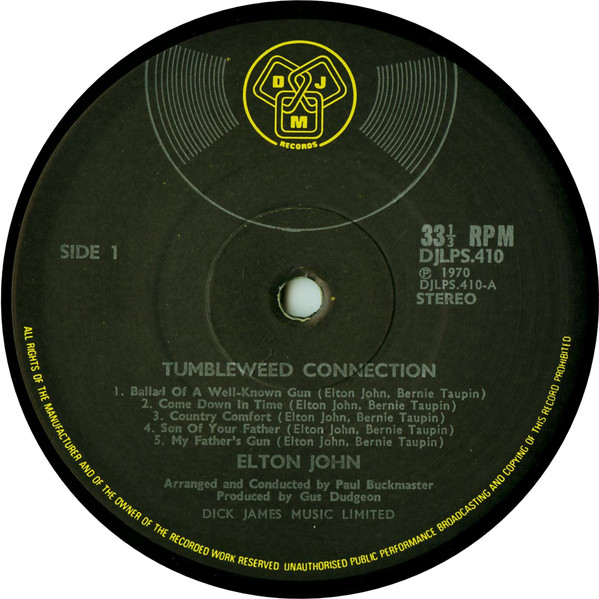Recycling vinyl was a common practice in the 70’s. Pressing plants had a tool called a “dinker,” primarily used to knock out the holes for 45’s but also used to knock out the labels on 33’s before melting down them down to press more records. Sometimes though, the dinking was skipped, and the old labels would just get melted into the vinyl.
I’m not sure why they did this. Maybe the dinker was broken? Maybe the record company was cost cutting? Maybe it was just sheer laziness? Whatever the case, that label paper mixed into the vinyl produced records that played with a LOT of surface noise, and that level of surface noise is commonly heard on the DJM pressings of many early Elton John albums, especially Tumbleweed Connection.

Who knows for sure WHAT was going in the pressing plant DJM used back in 1970. Whatever the case, the problem of surface noise on many of their E. John pressings presents a significant challenge for someone looking to buy a good sounding copy of what is arguably his masterpiece, especially if you live in the US.
Postage rates from the UK used to be relatively affordable compared to shipping in the opposite direction, but since Brexit that’s changed and the cost has risen considerably. This makes it a gamble to order UK copies of Tumbleweed from the UK, or for that matter anywhere in Europe these days. The chances of getting a noisy copy are high and the possibility of having to pay US rates to send it back unacceptable.
Nevertheless, UK copies of Tumbleweed are absolutely worth seeking out. The performances, production, recording, mixing and mastering on Tumbleweed are all astonishingly good, as is the sound on many of the DJM pressings. Some copies play quieter than others. Mine is rather noisy but MONSTROUSLY impressive sonically. So good in fact that I quickly stop noticing all the noise and just get completely involved in the music.
Sometimes I think as collectors we’re so focused on the condition of a record that we can overlook it’s sonic virtues. My copy of Tumbleweed has me wondering about audiophiles like myself who obsess over how quiet our turntable motor is when even a record with surfaces as loud as this one can still impress with its immediacy and transparency.
Do I wish I had a quieter copy? Sure, but will a quieter one have the sound mine has? Maybe. In the meantime I find I’m surprised at how a record with sound that is so OVERWHELMINGLY good can still overcome significant condition issues to stake out a valued place in my collection.
